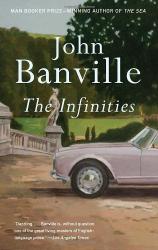The Infinities
Review
The Infinities
This novel is a chariot that brings the gods, the avatar of the infinities. Being human is a curse, bedeviled by having to choose between right and wrong --- “philosophical idealism” --- choices not necessary for immortals.
In John Banville’s first book since the Booker Award-winning THE SEA (and THE LEMUR, written as Benjamin Black), the titular infinities are immortals, Zeus and son Hermes, messenger of the gods who often led men astray. With this intriguing work, readers certainly are not led astray. This complex novel has page-length paragraphs and run-on sentences that prodigiously describe with all senses events leading to an enlightening conclusion well worth the read, a modern-versed Shakespeare. “You will have noticed my way with words, supposedly rare in a man of my calling. Words are so friendly, so accommodating, so loosely adaptable, not like numbers, with their tiresome insistence on meaning only what they mean and nothing more.”
Temporal “Old Adam” Godley has a stroke. He “felt, actually felt, a blood vessel bursting in his brain, and toppled forward on the floor, his face to the tiles and his scrawny bare bum in the air.” Adam “fears premature burial” and considers death “the age-old inquisition.” His daughter Petra, the “loony sister” of young Adam, manages the care of their father at Arden House, a magnificently described estate rivaling Wuthering Heights. Adam-the-elder has regrets: “I treated my children as adults and my wife as a child...and now it is too late to make amends. Spilt milk, spilt milk --- the dairy floor is awash and the dairyman and his missus are weeping buckets.”
The narrator assumes earthly forms and sometimes doesn’t like the experience: “The milk was barely cool and noticeably soured; one of the incidental interests of taking on temporary mortal form is the opportunity it affords of sampling new sensations. I had never tasted sour milk before; I shall not taste it again.” Even immortals acknowledge shortcomings, when they inhabit mortal coils, “one of those shameful social compromises that happen in dreams.”
With epic poetic prose, the over-wordiness isn’t haughty. But then, immortals and infinities have æons to accumulate a voluminous vocabulary that kept this mortal coil springing to the dictionary every other page. Acutely detailed descriptions seem more like a movie than a novel. Not unlike the scene in 2001: A Space Odyssey where Bowman becomes an ever-devolving chrysalis, Old Adam counts clicks of a clock and steps taken to school, and relives his past in sort of a drowning flash-before-your-eyes: “[T]he impossibility of accuracy torments him.” Observations question what is reality: “For what is spirit in this world may be flesh in another. In an infinity of worlds all possibilities are fulfilled.”
At the end, a touching scene has Old Adam Godley temporarily alert, facing the world through open windows in the Sky Room. He imparts knowledge to each in the household, giving precious gifts to all, especially to young Adam and daughter-in-law Helen. Written with expansive verbiage, “compared to your barely articulate gruntings,” Godley’s world is an “infinity of worlds” that requires readers to pay close attention. “It is a world where nothing is lost, where all is accounted for while yet the mystery of things is preserved.” This momentously cerebral work of literary art barely misses a five-star rating, only because of tangential asides.
Reviewed by L. Dean Murphy (DeanMurphy@Verizon.net) on April 28, 2011




